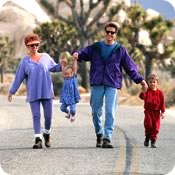 According to the American Heart Association (AHA), adults aren't the only ones at risk for heart disease, stroke and other cardiovascular diseases-kids are too. More and more children of all ages are overweight than ever before. As a result, weight-related health problems that are typically found in adults are becoming more common in our kids. Overweight children are at risk for diseases that will affect them in childhood, such as Type 2 (formerly called "adult-onset") diabetes, and for health issues that they'll face as adults if they don't lose weight. By reducing your overweight child's weight gain now, or helping him lose weight by eating healthy foods and becoming active, you can lower his risk of developing several serious conditions, including:
According to the American Heart Association (AHA), adults aren't the only ones at risk for heart disease, stroke and other cardiovascular diseases-kids are too. More and more children of all ages are overweight than ever before. As a result, weight-related health problems that are typically found in adults are becoming more common in our kids. Overweight children are at risk for diseases that will affect them in childhood, such as Type 2 (formerly called "adult-onset") diabetes, and for health issues that they'll face as adults if they don't lose weight. By reducing your overweight child's weight gain now, or helping him lose weight by eating healthy foods and becoming active, you can lower his risk of developing several serious conditions, including:
- Diseases that can occur in childhood, including asthma, breathing problems, high blood pressure, Type 2 diabetes, high cholesterol, depression, liver and gallbladder diseases, sleep apnea (cessation of breathing during sleep) and more.
- Long-term diseases that occur in adulthood, including cardiovascular disease (heart attack and stroke), heart failure, respiratory problems, certain cancers, infertility and pregnancy complications, arthritis, and higher risk for sudden death.
Helping Your Overweight Child
If you think your child is overweight, check with his doctor to help you evaluate your child's weight and develop a family action plan for weight management. The doctor may refer your child to see a dietitian who can help your child meet his nutrition goals. Typically, professionals will recommend one of three weight management options:
- Slowing down the rate at which your child is gaining weight
- Stopping your child from gaining weight (weight maintenance)
- Losing excess weight
When children are involved, any weight loss program should be monitored by professionals, such as a doctor and dietitian. When changing your family's lifestyle to emphasize healthy, long-term lifestyle changes, be sure to avoid:
- Fad diets and quick fixes-these usually result in unsafe, short-term weight loss.
- Programs designed for adults-most commercial programs are not appropriate for children.
- Weight loss camps and clinics-even though these are marketed to children, they often promise unrealistic results.
Getting Healthy as a Family
Besides knowing what to avoid, what should you be certain to do? Kids look to their parents to help them learn to be healthy. If you're not sure how to help your family live a healthier life, follow these tips, developed by the AHA.
- Set specific goals and realistic limits. Don't push your kids too far or emphasize winning. Kids need time to be kids too, and shouldn't feel pressure to stay involved in activities or excessively train for a sport. If goals or limits are drastic, you're setting your child up for failure. Discover your child's fitness needs.
- Find new ways to celebrate good behavior. Our culture has enough celebrations that focus on food. Rewarding kids with food teaches them to turn to food for reasons other than hunger and nutrition. Reward your child with praise, a new toy, a fun outing, or some special "Mom" or "Dad" time together.
- Make dinnertime a family time. Families who eat meals together at home consume more nutrients and less junk. Plus, it's a chance for the whole family to connect, bond, and learn from each other. Get eight reasons why you should eat together as a family.
- Make a game of reading food labels. Understanding food labels is an important skill for everyone to know. After learning how to as a family, challenge each other during your shopping trips to find the healthiest bread, cereal, snacks and more. Here's a quick lesson in reading a nutrition label.
- Be an advocate for healthier children. Not every family has access to the health information that you do, and only through advocacy and support can other people benefit from your knowledge and skills. Get involved with planning the school's lunches, snacks, or physical activity requirements, for example.
Remember that as a parent, it's on you to teach your kids the things that they won't learn in school or on their own. You are a mentor, a guide, and an inspiration! Getting healthy should be a family activity that everyone participates in together.
|
 According to the American Heart Association (AHA), adults aren't the only ones at risk for heart disease, stroke and other cardiovascular diseases-kids are too. More and more children of all ages are overweight than ever before. As a result, weight-related health problems that are typically found in adults are becoming more common in our kids. Overweight children are at risk for diseases that will affect them in childhood, such as Type 2 (formerly called "adult-onset") diabetes, and for health issues that they'll face as adults if they don't lose weight. By reducing your overweight child's weight gain now, or helping him lose weight by eating healthy foods and becoming active, you can lower his risk of developing several serious conditions, including:
According to the American Heart Association (AHA), adults aren't the only ones at risk for heart disease, stroke and other cardiovascular diseases-kids are too. More and more children of all ages are overweight than ever before. As a result, weight-related health problems that are typically found in adults are becoming more common in our kids. Overweight children are at risk for diseases that will affect them in childhood, such as Type 2 (formerly called "adult-onset") diabetes, and for health issues that they'll face as adults if they don't lose weight. By reducing your overweight child's weight gain now, or helping him lose weight by eating healthy foods and becoming active, you can lower his risk of developing several serious conditions, including:




-/8a17fd49-134d-408a-a1e4-668c1200a01b.jpg)

Member Comments